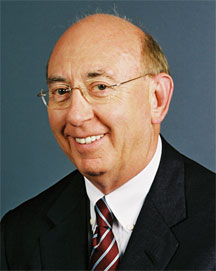
Chemotherapy is a type of cancer treatment that uses one or more anti-cancer drugs as part of a standardized chemotherapy regimen. Chemotherapy may be given with a curative intent, or it may aim to prolong life or to reduce symptoms. Chemotherapy is one of the major categories of the medical discipline specifically devoted to pharmacotherapy for cancer, which is called medical oncology.
Fluorouracil (5-FU), sold under the brand name Adrucil among others, is a chemotherapy medication used to treat cancer. By injection into a vein it is used for colon cancer, esophageal cancer, stomach cancer, pancreatic cancer, breast cancer, and cervical cancer. As a cream it is used for actinic keratosis, basal cell carcinoma, and skin warts.

Oxaliplatin, sold under the brand name Eloxatin, is a cancer medication used to treat colorectal cancer. Often it is used together with fluorouracil and folinic acid (leucovorin) in advanced cancer. It is given by injection into a vein.
Matuzumab is a humanized monoclonal antibody for the treatment of cancer. It binds to the epidermal growth factor receptor (EGFR) with high affinity. The mouse monoclonal antibody (mAb425) from which matuzumab was developed at the Wistar Institute in Philadelphia, Pennsylvania
Harry F. Bisel, M.D. (1918–1994) was an American oncologist. With Fred Ansfield, Herman Freckman, Arnoldus Goudsmit, Robert Talley, William Wilson, and Jane Wright, was one of the founding members of the American Society of Clinical Oncology (ASCO). This group of pioneering doctors, through the formation of ASCO, is largely credited with the development of modern American clinical oncology. In 1964, Bisel was elected the first president of ASCO. He was active in the American Cancer Society and was a consultant to the National Cancer Institute. Bisel was a founding member of the American Society of Preventive Oncology as well as the American Association for Cancer Education.
Tegafur/uracil is a chemotherapy drug combination used in the treatment of cancer, primarily bowel cancer. It is also called UFT or UFUR.

Jane Cooke Wright was a pioneering cancer researcher and surgeon noted for her contributions to chemotherapy. In particular, Wright is credited with developing the technique of using human tissue culture rather than laboratory mice to test the effects of potential drugs on cancer cells. She also pioneered the use of the drug methotrexate to treat breast cancer and skin cancer.
The American Society of Clinical Oncology (ASCO) is a professional organization representing physicians of all oncology sub-specialties who care for people with cancer. Founded in 1964 by Fred Ansfield, Harry Bisel, Herman Freckman, Arnoldus Goudsmit, Robert Talley, William Wilson, and Jane C. Wright, it has nearly 45,000 members worldwide.
Ramucirumab is a fully human monoclonal antibody (IgG1) developed for the treatment of solid tumors. This drug was developed by ImClone Systems Inc. It was isolated from a native phage display library from Dyax.

Carmofur (INN) or HCFU (1-hexylcarbamoyl-5-fluorouracil) is a pyrimidine analogue used as an antineoplastic agent. It is a derivative of fluorouracil, being a lypophilic-masked analog of 5-FU that can be administered orally.

Semustine is a drug used in chemotherapy. It is structurally similar to lomustine, being distinguished from it only by an additional methyl group. It has been taken off the drug market for investigation of its cancerous effects, rated as IARC Group 1 carcinogen or a known carcinogen.

The McArdle Laboratory for Cancer Research is a basic cancer research facility located on the University of Wisconsin–Madison campus in Madison, Wisconsin. It houses the university's Department of Oncology. The staff of the McArdle Laboratory numbers approximately 200. Twenty-eight faculty members lead research groups focused on various fields such as cancer virology, signal transduction, cell cycle, cancer genetics, and carcinogenesis.

John E. Niederhuber, MD was the 13th director of the National Cancer Institute (NCI), from 2006 until July, 2010, succeeding Andrew von Eschenbach, who went on to become a director at biotechnology firm BioTime. A nationally renowned surgeon and researcher, Dr. Niederhuber has dedicated his four-decade career to the treatment and study of cancer - as a professor, cancer center director, National Cancer Advisory Board chair, external advisor to the NCI, grant reviewer, and laboratory investigator supported by NCI and the National Institutes of Health. He is now Executive Vice President/CEO Inova Translational Medicine Institute and Inova Health System and Co-Director, Johns Hopkins Clinical Research Network.
Wafik El-Deiry is an American physician and cancer researcher who is the Associate Dean for Oncologic Sciences at the Warren Alpert Medical School, Brown University and the Director of the Joint Program in Cancer Biology at Brown University and its affiliated hospitals. He was previously Deputy Director of Translational Research at Fox Chase Cancer Center, where he was also co-Leader of the Molecular Therapeutics Program.

The University of Wisconsin Carbone Cancer Center (UWCCC) holds the unique distinction of being the only comprehensive cancer center in Wisconsin, as designated by the National Cancer Institute (NCI), the lead federal agency for cancer research. It is an integral part of both the University of Wisconsin (UW) and the University of Wisconsin Hospital and Clinics. It is located in Madison, Wisconsin.

Wolfram Samlowski is a medical oncologist with Comprehensive Cancer Centers of Nevada (CCCN) and a member of the Research Developmental Therapeutics and Genitourinary Committees for US Oncology. His research interests include translational research and development of novel cancer immunotherapy agents, translational drug development as well as gene therapy. His clinical interests are in developing more effective treatments for advanced stages of melanoma and non-melanoma skin cancers, and renal cancer.
George Bosl is an American cancer researcher, holder of the Patrick M. Byrne Chair in Clinical Oncology at the Memorial Sloan-Kettering Cancer Center in New York City, and is a Professor of Medicine at the Weill Cornell Medical College. In 1997 he was appointed chair of the Department of Medicine at Sloan-Kettering.
Professor Minesh P Mehta, MD, FASTRO, is an American radiation oncologist and physician-scientist of Indian origin, Ugandan birth, Zambian Schooling and American Training, who contributed to the field of oncology for more than two and half decades.

Pembrolizumab is a humanized antibody used in cancer immunotherapy. This includes to treat melanoma, lung cancer, head and neck cancer, Hodgkin lymphoma, and stomach cancer. It is given by slow injection into a vein.
FOLFIRINOX is a chemotherapy regimen for treatment of advanced pancreatic cancer. It is made up of the following four drugs:










